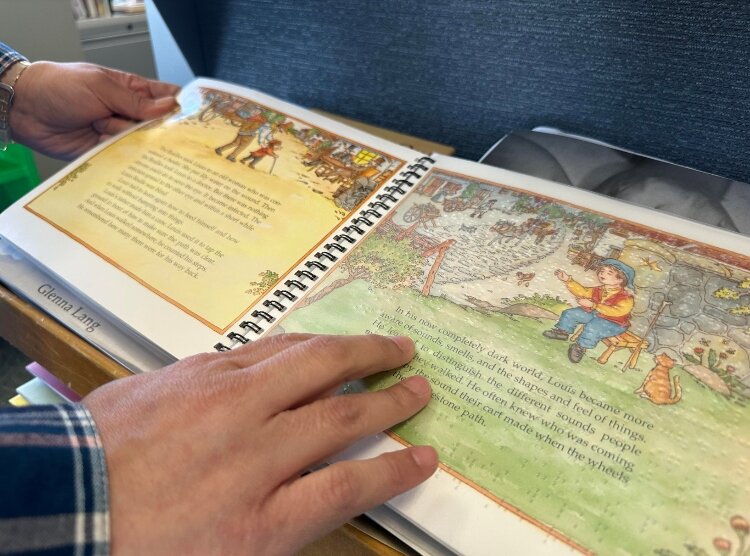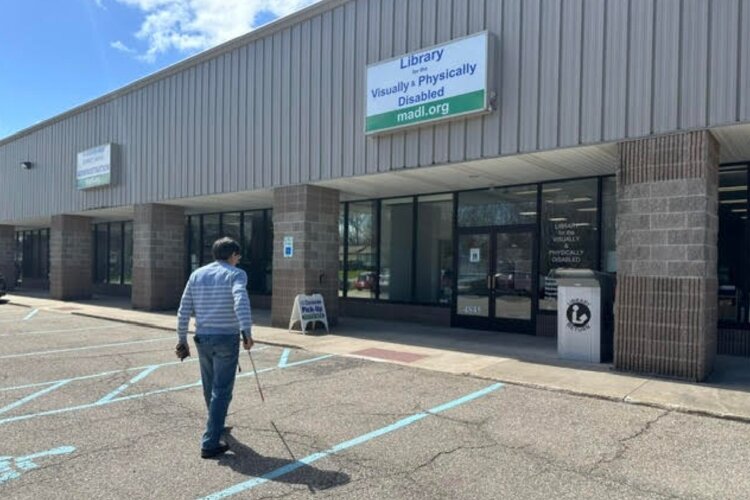When I walk into the Muskegon Library for the Blind and Physically Handicapped, I feel a sense of nostalgia. It’s the calming silence of thousands of books lined up on the shelves and the sweet smell that only a library or used bookstore can give off. It’s a warm feeling, and nothing beats it.
This library is part of the Muskegon Area Library and is a fully-featured library with a children’s section, public computers, and many other resources. However, this library specializes in providing additional services for people with disabilities.
Last year, the Library of Congress’ National Library Service for the Blind awarded the Muskegon Library its Community Library/Advisory Outreach Center of the Year award.

 Photo by Shandra Martinez The library has equipment to enlarge images.
Photo by Shandra Martinez The library has equipment to enlarge images.
The library has one full-time librarian and one part-time reading advisor and serves over 940 patrons in Muskegon and Ottawa Counties, Michigan.
Some of the library’s initiatives include the Senior Book Bin, which delivers boxes of large print books to local senior citizen groups each month, and Phone a Story, a dial-in service offering weekly recordings of poetry, short stories and children’s stories.
The library has a range of technology available to its patrons, including closed-circuit televisions that magnify images, optical character readers, refreshable Braille displays and interactive game tables that stimulate memory development for people with intellectual disabilities.
It offers an extensive collection of large print books for the visually impaired and a talking book program for the visually and physically impaired.
“We try to serve everyone with disabilities,” said Saxe Mahoney, head librarian for the blind and physically disabled library.

 Photo by Shandra Martinez Librarian Saxe Mahoney displays the digital player for the Talking Books program.
Photo by Shandra Martinez Librarian Saxe Mahoney displays the digital player for the Talking Books program.
Huge selection of audiobooks
The library’s most popular offering is its talking book program. With approximately 120,000 audiobooks and dozens of audio magazines, this nationwide program brings the world of books into the lives of people with disabilities.
About 900 people in the library’s two-county area use the talking book program, Mahoney said, and those who qualify have a variety of disabilities.
“This program is for people who can’t read regular print or who have a reading disability such as dyslexia,” Mahoney said, “but it’s also for people who can’t hold a book in their hands. So if someone can see but can’t hold a book open because of Parkinson’s disease or arthritis, they could still qualify.”
Those who qualify will be loaned a digital standard player capable of playing audiobooks. These devices can be adapted to accommodate an individual’s disability.
For example, some digital devices have a breath switch – for people who have lost a limb or have dexterity problems that prevent them from holding a book open – you breathe into the machine to operate it, while others have pillow speakers for people who are bedridden.

 Photo courtesy of Shandra Martinez The library has a large collection of Braille books.
Photo courtesy of Shandra Martinez The library has a large collection of Braille books.
You must meet the program eligibility requirements
Mahoney said adaptive applications are available to help people with hearing impairments hear audiobooks, and digital players have built-in amplified speakers that can play audiobooks at a loud volume when headphones are plugged in.
“It’s incredibly loud. To qualify, you need to apply separately. (Applicants) need to have the application signed by an audiologist,” Mahoney said.
To qualify for the Talking Book program, people must first fill out an application, and part of the application requires that an authority figure, such as a therapist, doctor, nurse or social worker, verify that the applicant meets the program’s qualifications, Mahoney said.
Once you qualify for the Talking Book Program, the process of receiving your audiobook begins: You will be sent a digital player that has a slot into which you can insert the cartridge that contains the downloaded audiobook.
“The cartridge is like a blank flash drive, and we’ll fill it with as many audiobooks as you want and mail it to you,” Mahoney said.
Your cartridge will be mailed to you in a thick blue plastic container. There is no limit to how long you can keep your cartridge. Once you’ve finished listening to your audiobook, simply mail the cartridge back in the same blue container. No postage fees will be charged.
When setting up audiobook reception, users can choose from a large list of categories, genres and authors, Mahoney said. Audiobooks in that genre are delivered on cartridges, and users can add as many audiobooks as they want per cartridge.
Individuals who qualify for the Talking Book Program can also utilize the BARD (Braille and Audio Reader Download) website. When users request BARD, they are sent a link to the website where they must add a username and password. They can also download the BARD app onto their smart device or cell phone.
“You log in, download the book to your device,” Mahoney says, “and then you can delete it when you’re done.”
If you can read Braille, we have Braille e-readers available for loan, so you can download Braille books and read them on the go.

 Photo by Shandra Martinez Library assistant Sharifa Alhasni explains the library’s accessibility feature, the Tovertafel (Dutch for “magic table”).
Photo by Shandra Martinez Library assistant Sharifa Alhasni explains the library’s accessibility feature, the Tovertafel (Dutch for “magic table”).
Use the app to listen anywhere
Using apps on portable devices like mobile phones makes it easier to listen to books on the go, as you don’t need to carry around a bulky digital reader.
For avid readers like me, it’s great to have the BARD app available on my smartphone as well as my digital reader. When I’m waiting for an appointment or the bus, I can kill time by listening to audiobooks downloaded on my phone. When I’m at home, I can listen to audiobooks on my digital reader while I do chores.
Technology has brought big advancements to talking book programs, which began nearly a century ago. In the 1920s, records and record players were delivered by mail, Mahoney said. Over the years, record players and records gave way to larger cassette players and cassette tapes, and now audiobooks are in digital format.
“(The program) started out as just for the blind, then expanded to include people with low vision, physical disabilities and more recently people with learning disabilities,” Mahoney said.
Audiobooks are added to the collection weekly. There are books for children, teens, and adults. Recently, audiobooks have been offered in a variety of languages, from English to Spanish, French to Chinese.
“The program is national, so if you move, you can take the course at any library,” Mahoney says.
The Library for the Blind and Physically Handicapped is at 4845 Airline Road, Muskegon. The phone number is 231-737-6310.
To request information about applying for the Talking Books program, email the library at [email protected] or visit www.madl.org/lvpd .
Photo by Shandra Martinez
This article is part of a multiyear series, “Disability Inclusion,” exploring the growing state of West Michigan’s disability community. The series is made possible in partnership with the West Michigan Independent Living Centers organization.

